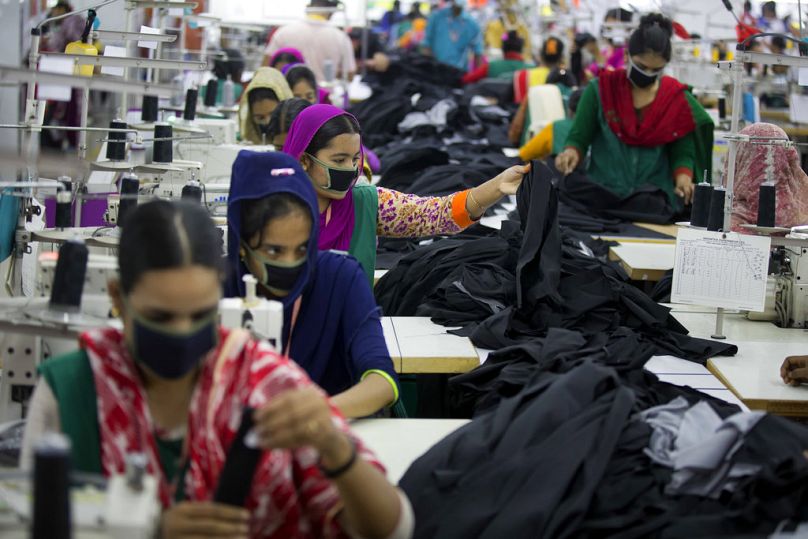The DSA's first signs of impact are becoming visible, but what is stopping big tech from treating everyone who uses their services fairly and equitably, Claire Pershan, Odanga Madung and Kiito Shilongo write.
EU policymakers often tout the Brussels effect — Europe's regulatory influence and market power around the world — as a force to exert global change.
 ADVERTISEMENT
ADVERTISEMENT
 ADVERTISEMENT
ADVERTISEMENT
But as its platform accountability rulebook, the Digital Services Act, comes into full force on 17 February, many effects seem unlikely to spill over outside the bloc.
The Digital Services Act, Europe's most acclaimed and expansive set of rules to strengthen the transparency of digital services is here.
These rules will oblige the designated largest online platforms (VLOPS) and search engines (VLOSES) like Google, TikTok, and Facebook, to be more transparent and accountable about things like their advertising practices, recommender systems, and content moderation decisions.
At a time when social media companies' outsized influence has shaken up democracies and other critical pillars of our society, the DSA presents an opportunity to reclaim this authority; an overdue attempt to draw a line on where the buck stops.
But it may be necessary for other regions to step up and write their own rules.
What can we learn from 'The Brussels Effect'?
The DSA's first signs of impact are becoming visible through transparency reports, ad repositories, restrictions on targeted advertising and ads targeting minors, and the ability to opt out of personalised recommendations, among other service updates.
However, many of these changes relate to activities and advertisements served within the EU only.
For example, Meta’s hotly debated ads-free subscription is only available in the EU, EEA, and Switzerland, and TikTok’s less-personalised feed is EU-only, as is Meta’s updated version for Facebook and Instagram which includes Reels and Stories.
LinkedIn’s “most recent” as opposed to “most relevant” feed is available worldwide but with a difference between versions for people with an EU IP address and those without one. The DSA’s eagerly awaited data access possibilities are for research related to societal risks in the EU, as opposed to global risks.
This supports expert analysis which estimated that the DSA may have “relatively little direct impact on the behaviour of platforms outside of the EU.”
In this sense, the DSA has a slightly different vibe from the General Data Protection Regulation (GDPR); many companies took up the GDPR as a global standard, making the regulation one of the most cited recent examples of “The Brussels Effect”.
A spillover effect made in the EU
The Brussels effect, a term coined by Anu Bradford, is the theory that the EU influences norms beyond its borders by either creating industry standards or by inspiring similar regulations elsewhere.
To study the effect, in 2012, Bradford also looked at EU chemical regulation, which ended up improving health protection in the United States.
However, chemicals banned in the EU were used elsewhere, notably in Kenyan agriculture to the detriment of Kenyans.
The chemical industry serves as an important reminder of the complexity of the Brussels effect: while the DSA is already starting to bear fruits, it seems to reflect other instances where corporations only sold their best products to a handful of countries.
The DSA is a regulation for the European market, but it can and should inspire a transfer of learning and capacities to the global majority regions.
And as companies empower consumers in Europe with safer, more transparent, and more privacy-protecting features, shouldn't they apply these updates equitably to the rest of the world?
Why don’t companies roll out all their DSA-inspired features globally?
Why can't we replicate these changes everywhere?
Platforms have been copy-pasting content moderation policies at their convenience. For instance, we've seen how election policies for global majority countries are often translated from policies designed for countries like the US.
When it comes to decisions that may affect their business more fundamentally, platforms seem more hesitant to replicate the same features globally.
Can changes like limiting ad personalisation ultimately reduce advertising revenue? Are the EU ad libraries and transparency reports so onerous to produce that they can’t be replicated in all regions of operation? For the designated “large” companies that specialise precisely in providing services at scale, this seems contradictory.
At the same time, the DSA may have some less glamorous spillover effects beyond the EU’s borders. Content moderation or data labelling work is often outsourced to countries where labour is cheaper. This came to light acutely in the case of Meta.
Will these phenomena be considered a systemic risk under the DSA?
Looking at another global industry may be useful. The fashion industry is built on mass exploitation of labour from the global majority, reproducing historical colonial practices that mostly benefit the imperial country.
In reality, the ethical remedies proposed and adopted within the EU such as re/upcycling interventions, repair programs instituted by clothing stores, or the use of sustainable materials are only applied in a few so-called powerful countries.
For example, a campaign by the Or Foundation in Ghana highlights how the European Commission's proposed amendments for Extended Producer Responsibility do not account for the global effects of secondhand clothing.
This is a global matter after all
If the current DSA obligations are anything to go by, platforms have illustrated they can implement significant changes touching millions of users.
What is stopping them from treating everyone who uses their services fairly and equitably? It took some arm-twisting to get this amount of platform accountability but the bottom line is, it is possible. And now is the time to demand these rights for everyone.
Lawmakers in other regions should be taking notes of the successes and failings of the DSA and preparing their complimentary rulebooks.
If companies refuse to roll out their new protections equitably and globally, other leaders will have to act to ensure their residents the same quality of service.
And since the governance of digital services is a global issue, extending these rights to everyone will also improve the overall quality of services for those in the EU.
Claire Pershan is Mozilla’s EU Advocacy Lead focused on the implementation of the Digital Services Act. She has previously worked on disinformation policy at the EU DisinfoLab and on online hate at the French think tank Renaissance Numerique. Odanga Madung is a senior researcher at Mozilla, studying platform transparency, election integrity, and disinformation. Kiito Shilongo is a Senior Tech Policy Fellow at Mozilla, focused on national tech policies and regulations on the African continent.
At Euronews, we believe all views matter. Contact us at view@euronews.com to send pitches or submissions and be part of the conversation.













